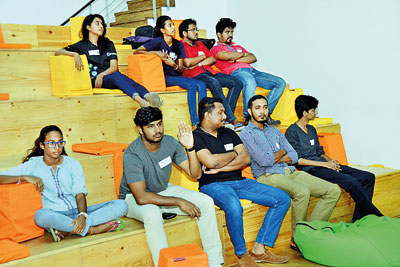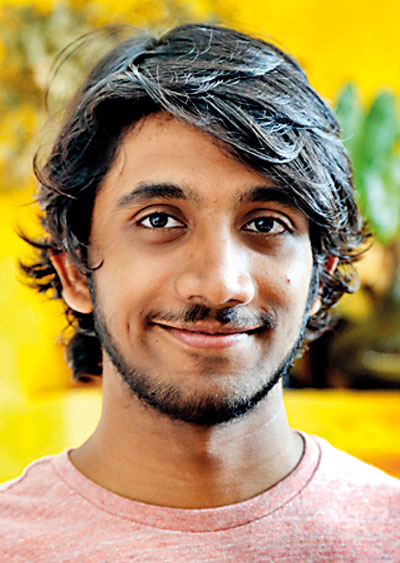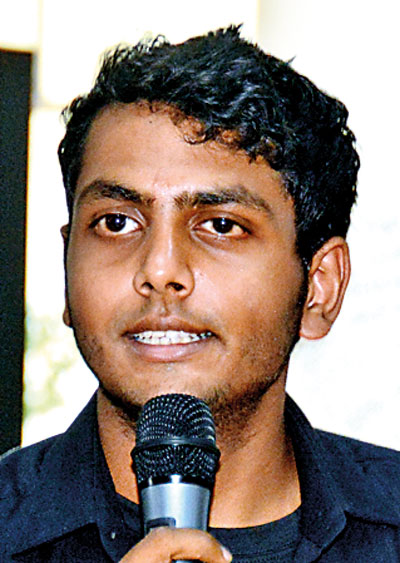Arts
Want to be another Mark Zuckerburg, Steve Jobs or Bill Gates?
Mark Zuckerburg, Steve Jobs and Bill Gates are some of the richest and most influential entrepreneurs of recent times. They have amassed a great fortune after the start-up businesses they worked on succeeded, elevating them to the status of cultural icons. Much has been said about them and the traits they have in common, but perhaps the most significant one is the fact that they were all high school dropouts.

A section of the participants at this year’s event last weekend. Pix by M.D. Nissanka
How does one build a successful start-up? Do you need to be a technological genius who drops out of college to pursue a brilliant idea?
This is where Youth Hack hopes to step in– to educate Sri Lankan youth on the start-up culture and share ideas of this intriguing world.
A not for profit organisation Youth Hack attempts to teach people how to ‘hack’ their education and other resources to build a start-up. They do this by helping high school and university students understand some of the areas they need to explore to create products which people would want to buy. Youth Hack has workshops and other events in Manila, Philladelphia, Singapore and Korea. The idea was brought to Sri Lanka by brothers Sanjula and Sajana Weerawardhena. Sanjula, who studies at the University of Pennsylvania with David Ongchoco (who founded Youth Hack), felt that the idea could work in Sri Lanka. They have just finished their second Youth Hack workshop here, and are buzzing with ideas of how to take the event even further next time.
While last year’s event was organised mainly by Sanjula, this year’s event was spearheaded by Sajana because Sanjula is interning for a start-up in New York. They have learned much from the two workshops and have fine-tuned the event as they went along, changing everything from ticket prices to the sign up details and everything in between. What has not changed however, is the model which they explore in detail and the basic ideas which they hope to instil in the youth who attend. Sajana explains that they discuss a business model known as the ‘Lean Start-up Model’, a scientific approach to managing start-ups. The guest speakers help explain the business environment in Sri Lanka, and the participants are divided into teams who pitch their ideas to judges, who assume the role of potential investors.
Sajana hopes that their event will help people understand that they have the option of pursuing a non-traditional career. “We want to break that idea that you need to be a doctor, lawyer or an engineer,” he states. He feels that “Start-ups are about solving real world problems and those solutions can help people by making their lives easier even as it helps you earn money,” he says. He feels that one of the significant differences between Sri Lanka and the United States is the fact that Sri Lankans use more physical money rather than credit cards and feels that the start-up culture in Sri Lanka will accelerate soon and improve the economy as well. When asked if he would build a start-up, Sajana (who just finished his freshman year at Stanford) smiles and replies that he would definitely “go for it.”
Pointing out that anyone who has created a start-up, including Bill Gates, Mark Zuckerburg and Steve Jobs would only agree on a few things with regards to what creates a good start -up, Sajana gives one piece of advice “There are no do’s and don’ts, there is nothing I can say with certainty about the exact steps you can take to create a start-up because no one can really say too much with certainty,” he says, pointing out that Youth Hack acknowledges that there are no hard and fast rules in the game, only mental frameworks to follow which just might help you beat the odds.
To follow Youth Hack Sri Lanka, please visit their Facebook page https://www.facebook.com/YouthHackSL/

Sajana Weerawardhena

Bhanuka Haris-chandra: A guest speaker at the recent event

